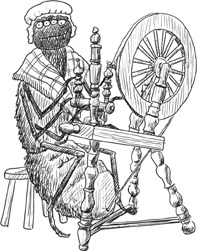
Once upon a time, people believed that a certain insect could find its way into the human brain and live there quite happily.
Was it:
A. A cockroach?
B. An earwig?
C. A spider?
ANSWER: B. The earwig!
It was once widely believed that earwigs could creep into a sleeping person’s ear, and then scuttle up to their brain where they would live and breed. This ancient belief explains how the insects got their name. The Anglo-Saxons, who spoke Old English over 800 years ago, called all insects ‘wicgas’, which sounded a bit like ‘widgers’ and which is related to the word ‘wriggle’. When they discovered the earwig they called it ‘ear-wicgas’, or ear-insect.
There are lots of words for ‘earwig’ around the UK. In Yorkshire the earwig is called a ‘forkin robbin’ (the ‘fork’ part refers to their two pincers, while ‘robbin’ was a popular nickname), and in Cheshire they are known as ‘twitchbells’.

Did you know …
… that the word ‘spider’ comes from a very old English word meaning ‘to spin’ because a spider spins its webs. It was a ‘spinner’, just like, in fact, the ‘spinster’ — an old-fashioned name for an unmarried woman — because in years gone by spinsters would spin yarn for a living, having no husband to help bring in money.
